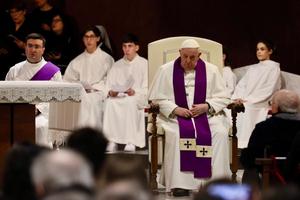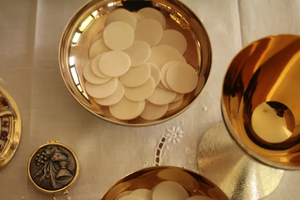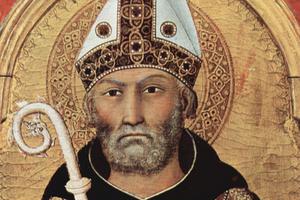Pope Francis Validates SSPX Confessions for Year of Mercy
The Holy Father’s action has been welcomed by Catholics as a positive step forward.

(Editor's Note: This story was updated at 3:48pm Eastern time).
WASHINGTON — Pope Francis has declared that priests of the Society of St. Pius X will be able to hear the confessions of Catholics — with no doubt as to their validity — during the upcoming Extraordinary Jubilee Year of Mercy, giving many Catholics hope that full reconciliation is closer than ever.
In a Sept. 1 letter expressing his intention that the Year of Mercy be for every believer “a true moment of encounter with the mercy of God,” Pope Francis stated that priests of the Society of St Pius X, which presently lacks official canonical status in the Church, would have full faculties from him during the jubilee year to hear the confessions of “those faithful who for various reasons choose to attend [SSPX] churches.”
“This Jubilee Year of Mercy excludes no one,” he said. “From various quarters, several brother bishops have told me of their good faith and sacramental practice, combined, however, with an uneasy situation from the pastoral standpoint. I trust that in the near future solutions may be found to recover full communion with the priests and superiors of the fraternity.”
The Jubilee Year of Mercy begins on the Solemnity of the Immaculate Conception, Dec. 8, and ends on the following Solemnity of Christ the King, Nov. 20, 2016.
The Holy Father concluded, “In the meantime, motivated by the need to respond to the good of these faithful, through my own disposition, I establish that those who, during the holy Year of Mercy, approach these priests of the Fraternity of St. Pius X to celebrate the sacrament of reconciliation shall validly and licitly receive the absolution of their sins.”
SSPX Expresses Gratitude
The Society of St. Pius X expressed “its gratitude to the Sovereign Pontiff for this fatherly gesture” in a communication issued from its general house.
“During this year of conversion, the priests of the Society of St. Pius X will have at heart to exercise with renewed generosity their ministry in the confessional, following the example of tireless dedication which the holy Cure of Ars gave to all priests,” it stated.
Since the SSPX does not have a regular canonical status in the Church, its priests ordinarily do not enjoy the faculties to hear confessions — except in danger of death — and officiate sacramental marriages because they lack official jurisdiction. The lack of jurisdiction is the reason why the Vatican considers Masses by SSPX priests illicit, but still valid, although the question over whether assisting at an SSPX Mass fulfills a Catholic’s Sunday obligation remains a source of controversy.
The SSPX explained in its communication that it believes with certainty its priests can validly administer these sacraments because it has “extraordinary jurisdiction” that is provided for in canon law. The society generally holds that its priests have faculties owing to a “state of emergency” in the Church, although the Vatican disagrees with their interpretation of canon law.
However, the SSPX in its letter also recognized, “On the occasion of this holy year, Pope Francis wants all the faithful who wish to confess to the priests of the Society of St. Pius X to be able to do so without being worried.”
Peter Vere, a canon lawyer and former SSPX adherent, explained when the jubilee year begins, “There is no question that for one year they can validly absolve in the confessional — and it can always be extended.”
However, Ben Nguyen, a canon lawyer serving as canonical counsel and theological adviser for the Diocese of Corpus Christi, Texas, said the Pope’s letter, while filled with “beauty and magnanimity,” also had “canonical ambiguities … that will seriously need clarifications, so that the Pope’s desires can be implemented appropriately.”
“If this is a general grant of faculty, why was the language of ‘faculty’ never used; but if there are limitations, why are they not listed?” he said.
“In the meantime, this does seem to imply a couple of things: First, that the priests of the SSPX are not in full communion with the Church,” he said, “and, second, that the priests of the SSPX in fact have not had and currently do not have the faculty to absolve sins validly and licitly in confession and will not have it until the beginning of the Year of Mercy on Dec. 8, 2015.”
Vere said the Pope’s decision is a sure sign that reconciliation is moving forward, as the decision “moves the SSPX from an irregular state into a semi-regular one.”
He added that the Pope could at some point also decide to invoke his authority to retroactively recognize SSPX-witnessed marriages as sacramental.
“This would be something I would like to see happen,” he said. “But that’s a decision the Holy Father will have to make in conjunction with his closest advisers and the SSPX.”
“Functionally speaking, once marriage and confession are resolved, everything else is perfunctory, because those are the two big issues that most affect the laity.”
The Society of St. Pius X, a priestly society of almost 600 priests — as well as male and female religious and third-order members — operates without any recognized status in the Church, since being deprived of its canonical status in 1976. Pope Benedict XVI jump-started a new chapter, in trying to bring the society into a regular state in January 2009, by lifting the excommunications imposed on the SSPX’s four bishops who were consecrated without papal permission by its founder, Archbishop Marcel Lefebvre, who died in 1988. Talks stalled in 2012 without reaching a formal agreement, reportedly over some persisting differences regarding the society's view on the ordinary form of the Mass and the Second Vatican Council; however, the Vatican has made clear the society only lacks regular status and is not in a state of schism.
Major Win for Reconciliation
The Pope’s decision has followed a number of important recent developments in his papacy. The SSPX received official state recognition as Catholic in Argentina, a process that began when he was cardinal-archbishop of Buenos Aires and which was completed this year.
Pope Francis this year empowered the SSPX’s superior general, Bishop Bernard Fellay, to preside over a canonical trial involving a SSPX priest. Pope Francis also dispatched Auxiliary Bishop Athanasius Schneider of Astana, Kazakhstan, as his personal representative to SSPX formation houses — the last time an official papal visitation took place was 1987.
According to Kevin Tierney, a traditionalist Catholic writer who regularly contributes to Catholic Exchange, these events demonstrate the Pope’s latest gesture to the SSPX is not coming “out of left field.”
“I think this is a real, clear signal that things have definitely changed, and they will not be going back to the way they were before,” he said.
“This kind of move will save souls and will get people to the confessional,” he said, explaining that there are a number of Catholics who go to SSPX Masses but have refrained from seeking their priests out for confession over concerns about their validity.
Tierney said that, from a practical standpoint, it is not likely that the Pope would not put Catholics who had returned to confession and developed “a genuinely spiritual relationship with that [SSPX] confessor” in the situation where they could no longer go because the Year of Mercy had concluded.
The Holy Father’s emphasis about finding a solution “in the near future” also raises the possibility that he may agree with Bishop Schneider’s conclusion that “no weighty reasons” stand in the way of regularizing the Society of St. Pius X as they are, and then resolving the remaining doctrinal disagreements in that context.
“I really think that if there isn’t a reconciliation by then, they’re going to give it more time,” Tierney said.
Marie Donovan, a Catholic in Arlington, Va., whose family regularly attends SSPX chapels in Wisconsin and attends the society’s Masses whenever she can, told the Register she was “certainly encouraged by the Pope’s gesture, especially in the light of the opportunity for reconciliation with Rome.”
“This opportunity for reconciliation is a beautiful one,” she said. Donovan stressed that, for Catholics like her who attend SSPX chapels for Mass, and the society priests who minister to them, “that lack of full communion itself with Rome is not a cause for joy or happiness,” and they are looking forward to arriving at a solution.
“I think the approval of the confessions can build a positive understanding of both sides, and I think it will be an opportunity to have those further discussions,” she said.
Donovan noted a number of positive aspects of Pope Francis’ letter that did not escape her notice: She pointed out that he did not mention any caveats about seeking confession from SSPX priests for Catholics who do not attend SSPX chapels. She imagined that the Pope’s message will help not only Catholics in general who have been away from confession receive the sacrament from an SSPX priest, but will also help Catholics who attend SSPX Masses that may have been on the fence about going to a SSPX priest for confession.
“It’s all about attending to their good by going to something that is licit, according to the Pope.”
Room for the Holy Spirit
However, the Pope’s message also may be sending a signal to bishops and Catholics throughout the Church to follow his lead and adopt an active posture of welcome and reconciliation toward the SSPX and fellow Catholics who attend SSPX chapels.
Christopher Hoag, the catechetical program manager for the Diocese of Cleveland, said the Pope’s move “shows that the Holy Father has a concern for all the Catholic faithful.”
“If we truly believe in the oneness of the Church, we can’t alienate or ostracize one group simply for believing and practicing in a way previous generations did,” he said.
Hoag, whose doctoral dissertation was on implementing Summorum Pontificum in the Cleveland Diocese, added that it not only demonstrates Pope Francis’s genuine promotion of Church unity, but also shows that he has an interest in the concerns of traditionalist Catholics and of the Society of St. Pius X.
Hoag said he was hopeful that this was the first of upcoming actions that would bring about full ecclesial unity for the society.
“He’s giving the Holy Spirit that room in the Church to work for unity,” he said.
Catholics profess one Church, one faith and one baptism. But Hoag explained that the Church has no problem having room for “different theologies between East and West” for expressing that same faith.
“So there is room for different theologies, even within the West alone, keeping the unity of the same content of faith, but how that is lived out is a pastoral question.”
Will Mercy Prevail?
The question for all Catholics — both of the wider Church and those following the SSPX — is how they will respond to the Holy Father’s outreach.
According to Vere, the Pope’s decision as the Church’s supreme legislator sends a powerful signal to the bishops about his mindset toward the SSPX and how they should respond as well.
“His mindset is the classical Jesuit approach of rapprochement and developing these personal connections — starting with the relationship, and letting the canon law follow suite, rather than only agreeing to establish a relationship after you’ve sorted out all the canon law.”
Hoag agreed that the Holy Father is clearly calling in his letter “for closer bonds of unity between the local dioceses and the Mass centers of the society.”
“My concern is for how relationships at the local level are going to develop going forward,” he said.
“Will that charity be present? That’s a question whose answer we need to discern going forward. Because it is going to require, on both sides, humility as well as justice.”
Peter Jesserer Smith is the Register's Washington correspondent.
















